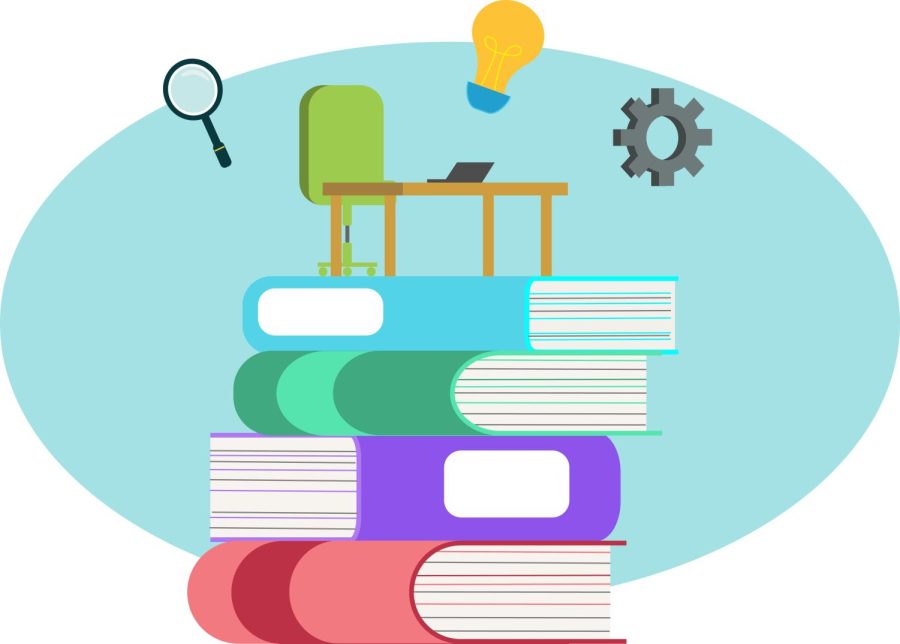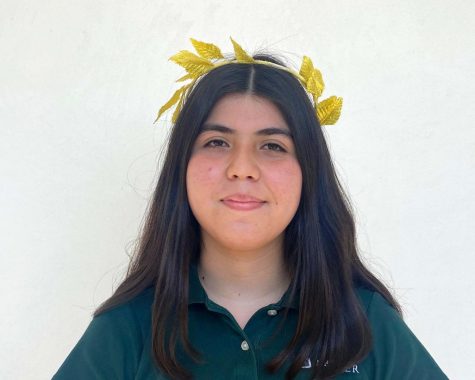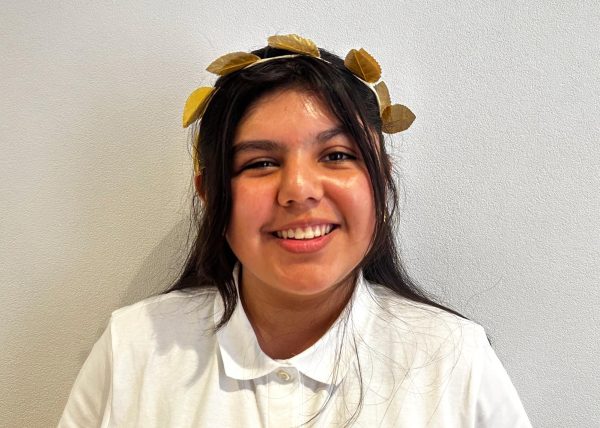Seniors develop research skills, explore own interests through humanities advanced study curriculum
Photo credit: Maia Alvarez
The illustration shows books and a laptop signifying the research students in the new advanced study curriculum delve into. Seniors who decided to take the advanced class equivalent of either their history or English course completed an individually designed, semester-long project. Graphic design by Maia Alvarez.
January 19, 2023
Laptops, groups of seniors and JSTOR printed articles fill the library once a rotation for the advanced study cohort meetings. These meetings are part of the new advanced study curriculum for English and history courses. In replacement of Advanced Placement classes in the humanities, seniors are able to dive into an individual research project that connects to their English or history studies. The topic of each project is designed by students with assistance from their teacher.
For seniors, humanities classes run on a semester-based schedule, and there are 12 classes to choose from. When taking this route of learning, students commit to semester-long essays or projects twice a year, in addition to the regular work being completed in class.
What does the process look like?
All students taking an advanced study in history or English met in the library as an educational cohort to participate in goal setting and different metacognitive activities activities led by English teacher Kristin Taylor, who serves as the advanced study coordinator. These activities allowed students to reflect and document their research journey. According to history department chair Bethany Neubauer, having an educational cohort helped her find a community during academic projects in graduate school.
“This was sometimes a pretty lonely endeavor…so I really looked forward to meetings with my orals group. We cheered each other on, commiserated when the task felt insurmountable…and generally relied on each other for the informal support that the professors weren’t expected to offer,” Neubauer wrote to Taylor for a seminar exercise. “Our meetings were definitely fun, but they also kept me on track and forced me to articulate my understanding of what I was reading.”
Senior Isabelle Verdery took the Literature of Fantasy & Fairy Tale course. Her research focused on analyzing how older and more recent fairytales negatively portray women. She said she wanted to explore how literature has affected society’s perception of what deems a woman to be pure or evil.
“I’m talking about how western folklore fetishes female purity and demonizes activity in women. The main fairytale that I am talking about is Snow White and how folklore really fetishes women who are sexually pure and innocent and how chase-ness and sexual allure are synonymous,” Isabelle Verdery said. “I’m arguing that, in order to be desirable, you have to be chased.”
For an advanced study project, students needed to complete different benchmarks before submitting their final work. For history, students crafted an annotated bibliography, wrote an outline, sourced evidence and completed a rough draft. English students sourced evidence, created a thesis and outline and wrote a rough draft before their final paper. Students scheduled one-on-one meetings with their teachers throughout the process.
What skills does research teach?
Isabelle Verdery said she appreciated how this project has equipped her with skills that will aid her in her future academic journey.
“I think it’s a really important skill to know how to do independent research, especially in college. I feel like this is going to be the thing that really prepares me the most,” Isabelle Verdery said. “We’ve done group projects [and] smaller research presentations, but we have never done something on this scale before. I think it’s important to have that experience before graduating. It’s really exciting to be given the opportunity to do something we are passionate about because it [motivates us] to do our own research instead of doing an assignment that we have to do.”
Many students, like senior Georgia Ehrlich, chose to take advanced study in both English and history. She took the Back to the Future and Voice of Democracy seminars. A common theme in both of her projects is contextualizing the current political climate. Students who took advanced study in both disciplines can choose to combine their topics into one paper.
“For my Back to the Future paper, I studied how Mormonism, Trumpism and the book ‘1984’ connected in terms of power structures, the obstruction of truth in all of them and how that plays a really big role in how they are able to gain larger blind follower ship,” Ehrlich said. “For my history paper, I am talking about culture wars in the U.S. and how culture wars could potentially, if solved, be a point of resolution to the current political polarization in the nation, or vice versa, could break our system if not solved.”
The process of bringing these research ideas to fruition was different for Ehrlich and Isabelle Verdery. For example, Ehrlich’s inspiration stemmed from personal experiences and interests, but she said she also saw how she was able to become more comfortable with research and allowing ideas to change over time.
“It’s one of those things where you start with an idea or you start with inspiration. I’m in a place where I don’t even recognize my first idea. I’ve done so much research, and my ideas have been so informed by what I’ve read,” Ehrlich said. “I struggled a lot with having political conversations and discourse with people recently because of the climate; I wanted to understand how we got there. I know so much more now about the topics that I initially thought I was an expert on and would write on than I anticipated.”
Senior Emma Verdery took Human Geography, and, at the start of this class, she learned about birth rates and global birth related policies. This unit sparked an interest for her, which is why she decided to focus her semester-long project on birth rate politics in India, China and Egypt.
“Although it’s a lot to keep up with along with regular curriculum, I think it depends on how passionate you are in your project,” Emma Verdery said. “I knew a lot of the one-child policy going on, which is probably the most notorious of anti-birth policies. To me, examining different countries’ policies around something we rarely think about was really cool.”
Senior Martha Castro said she is worried about the timing of the projects due to the new semester schedule. This year, second semester begins Jan. 24, and for seniors in semester-long seminars, the second advanced study process begins without a break.
“I really enjoy this project except that, I know this is the first semester doing it, but it’s kind of weird because we have two weeks until we go to the next semester,” Castro said. “I think that aspect is what makes it a little more difficult — managing my time.”
Research takeaways
For Isabelle Verdery’s project, she said being in an all-girls environment led her to challenge herself to look at her project from a feminist perspective. She said it has been impactful to learn about how literature and fairytales have affected the way women are treated in the world and share this information with peers.
“I really wanted to take a feminist perspective in these stories because most of them are written by men. I think it’s interesting what we can learn from that perspective and just how women are viewed in the world and how these archetypes are something that have been popularized by all sorts of things,” Isabelle Verdery said. “It’s important to know how our innocence is viewed. I was very interested in tracing the ties all the way back thousands of years ago to the Disney stories that we grew up on.”
Ehrlich said she hopes that future Archer students who do this process take the time to find a topic that brings them joy.
“Having a student-driven experience is being able to have that freedom and to choose what you want to choose,” Ehrlich said. “I also think it helps hold people accountable for their work; this is something you are interested in, so if we are going to be doing this process that is so long and individually driven, find something you love.”
Isabelle Verdery said although balancing both an English and history project has been challenging, she recommends that students not feel intimidated by the amount of writing because of the flexibility offered.
“You can do whatever medium you want. If what is stopping you from taking both is the amount of writing, I would say don’t let that make you only take one if you are really interested in diving deep in both,” Isabelle Verdery said. “I suggest taking at least one of them though because it is such a valuable skill to have, like even using JSTOR, is going to help so much. I feel like this is the assignment that is going to matter the most going forward.”










